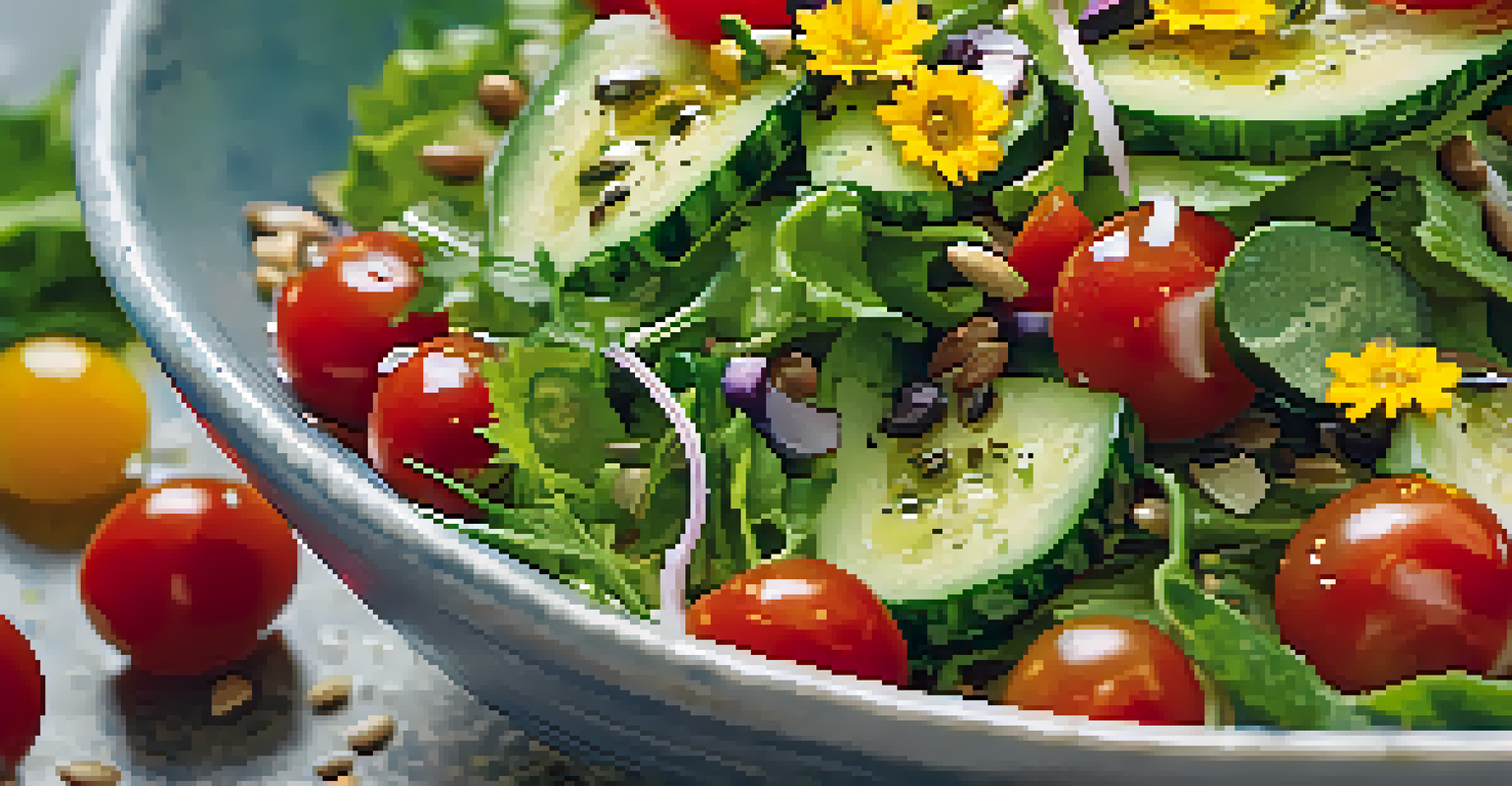The Science Behind Raw Foods and Cancer Prevention

Understanding Raw Foods: What Are They?
Raw foods are primarily unprocessed and uncooked foods, which include fruits, vegetables, nuts, and seeds. The idea behind consuming raw foods is that cooking can destroy essential nutrients and enzymes that are beneficial for our health. By eating these foods in their natural state, proponents believe we can maximize the nutritional benefits.
Let food be thy medicine and medicine be thy food.
Many raw food enthusiasts argue that this diet can lead to improved digestion, increased energy levels, and even weight loss. This is partly due to the high fiber content and low-calorie density of raw foods. Essentially, you're filling your plate with nutrient-rich options that keep you satisfied without the excess calories.
However, it's important to note that not all raw foods are created equal. Some raw foods may actually be harmful if consumed without proper preparation, such as certain beans and tubers. Therefore, understanding which raw foods are safe and beneficial is crucial for anyone considering this lifestyle.
Nutrients in Raw Foods: The Power of Enzymes
One of the most talked-about benefits of raw foods is their high enzyme content. Enzymes are essential for various bodily functions, including digestion and metabolism. When we cook food, we often destroy these valuable enzymes, which can lead to decreased nutrient absorption over time.

For example, raw fruits and vegetables are packed with enzymes that help break down food in our digestive system. This means that your body can better utilize the vitamins and minerals present in these foods. Moreover, some studies suggest that a diet rich in enzymes may reduce the risk of certain diseases, including cancer.
Raw Foods Maximize Nutritional Benefits
Eating raw foods like fruits and vegetables helps preserve essential nutrients and enzymes that are beneficial for our health.
However, while enzymes are vital, they aren't a cure-all. It's essential to have a balanced diet that includes both raw and cooked foods to ensure you're getting a wide range of nutrients and health benefits.
Antioxidants in Raw Foods: Cancer Fighters
Antioxidants are compounds that help neutralize free radicals, unstable molecules that can cause cellular damage and lead to cancer. Raw foods, particularly fruits and vegetables, are rich in antioxidants. For instance, berries, spinach, and broccoli are all excellent sources that can help protect cells from oxidative stress.
The food you eat can be either the safest and most powerful form of medicine or the slowest form of poison.
Consuming a variety of raw foods can increase your intake of these protective compounds, potentially lowering your risk of developing cancer. The idea is that by incorporating more colorful fruits and veggies into your diet, you're arming your body with the tools to fight off harmful cells.
While raw foods can boost your antioxidant levels, it's important to remember that cooking can also enhance the bioavailability of some nutrients. For instance, cooking tomatoes increases the availability of lycopene, a powerful antioxidant. Thus, a combination of raw and cooked foods may offer the best protection.
Fiber's Role in Cancer Prevention
Fiber is another critical component of raw foods that plays a significant role in cancer prevention. A high-fiber diet is linked to a lower risk of colorectal cancer, among others. Raw fruits and vegetables provide both soluble and insoluble fiber, which aid in digestion and promote a healthy gut.
Insoluble fiber helps to keep the digestive tract clean and functioning properly, while soluble fiber can lower cholesterol levels and stabilize blood sugar. This dual action supports overall health and can be instrumental in reducing the risk of developing various cancers.
Antioxidants and Cancer Prevention
Raw foods are rich in antioxidants, which can help neutralize free radicals and potentially lower the risk of cancer.
Incorporating more fiber-rich raw foods into your diet can be as simple as adding a salad or a smoothie to your meals. This small change can have long-lasting effects on your health and well-being.
The Role of Phytochemicals in Cancer Prevention
Phytochemicals are naturally occurring compounds found in plants that can have health-promoting properties. Many raw foods are rich in phytochemicals, such as flavonoids and carotenoids, which have been studied for their potential cancer-fighting abilities. These compounds can help reduce inflammation and combat oxidative stress in the body.
For instance, cruciferous vegetables like kale and Brussels sprouts are high in glucosinolates, which may help detoxify carcinogens and reduce cancer risk. By consuming a diverse range of raw foods, you can harness these powerful compounds to support your body's defenses.
While the effects of phytochemicals are still being explored, the evidence suggests that including more raw foods in your diet can be a smart strategy for cancer prevention. It's about creating a colorful plate filled with nature's best offerings.
Potential Risks of a Raw Food Diet
While there are numerous benefits to eating raw foods, there are also potential risks to consider. For some individuals, a strictly raw diet can lead to nutritional deficiencies, particularly in vitamins B12 and D, which are primarily found in animal products. This can lead to health issues over time if not addressed.
Moreover, certain foods may carry the risk of foodborne illness when consumed raw, such as meat, eggs, and some vegetables. It's essential to wash and handle raw foods carefully to minimize the risk of contamination. This is especially crucial for those with weakened immune systems.
Balance Raw and Cooked Foods
A balanced diet that includes both raw and cooked foods can provide a wide range of nutrients and health benefits.
Therefore, if you're considering a raw food diet, it's important to educate yourself on safe practices and ensure a balanced approach. Consulting with a nutritionist can also help tailor a plan that meets your needs while maximizing health benefits.
Balancing Raw Foods with a Healthy Lifestyle
Incorporating raw foods into your diet doesn’t mean you have to give up cooked foods entirely. A balanced approach can provide the best of both worlds, allowing you to enjoy the benefits of raw foods while still reaping the rewards of cooked meals. For example, you might enjoy a raw salad alongside a warm, cooked dish.
It's also important to consider other lifestyle factors that contribute to cancer prevention, such as regular exercise, adequate sleep, and stress management. A holistic approach that includes these elements, along with a diet rich in raw and cooked foods, can significantly enhance your overall health.

Ultimately, finding a dietary balance that works for you and aligns with your health goals is key. Listen to your body and make adjustments as needed to support your well-being.